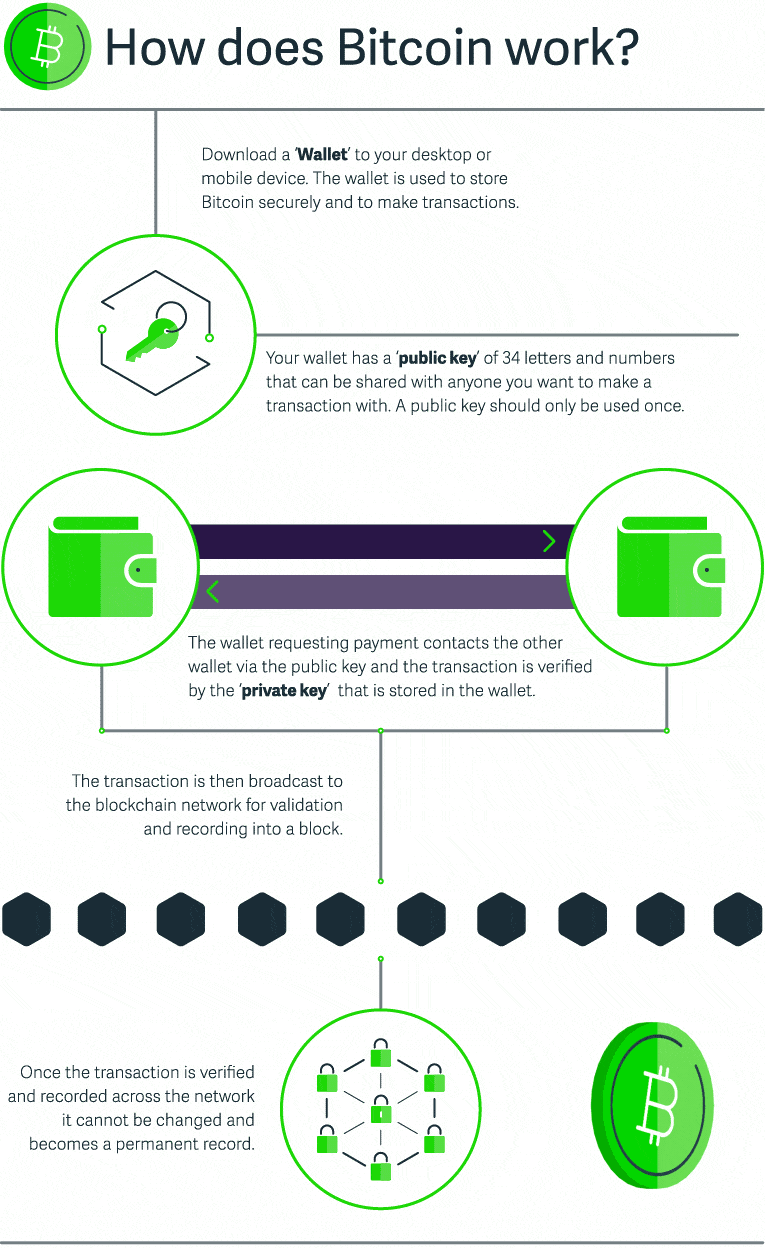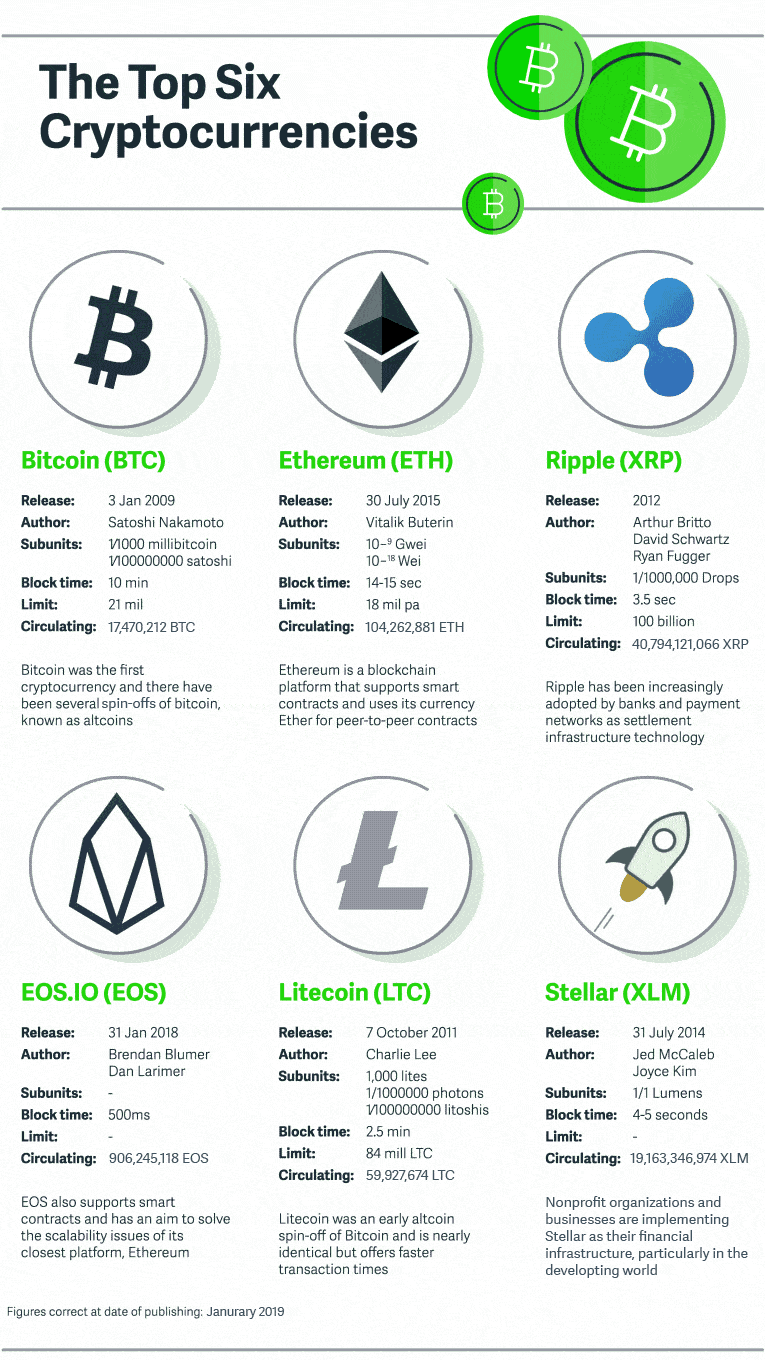Blockchain, cryptocurrency and Bitcoin for businesses

Are you thinking about integrating blockchain, cryptocurrency or Bitcoin into your business processes? If you’re like most and you’ve heard the hype, you might be tempted to seize the opportunity to forge a competitive advantage. Before you do, it’s important to understand the basics about these emerging technologies, including any potential risk.
Our comprehensive guide takes an in-depth look at blockchain, cryptocurrency and Bitcoin to help you decide how you could use them within your organization.
What is blockchain and how does it work?
Let’s start at the very beginning with the underlying technology of cryptocurrency – blockchain.
When developer Satoshi Nakamoto set about creating one of the world’s first cryptocurrencies, he needed a way to secure transactions without a central governing authority. If cryptocurrency was going to be decentralized, as he promised it would be, he needed a way to confirm payments and prevent people from double spending.
Blockchain was the ideal solution as it acts as a digital ledger by recording information like the details of the sender, the receiver, and the transaction amount. Each transaction is recorded and stored in blocks, which are then linked and secured via an encryption technique known as cryptography. A new block is generated and added at a set regular interval and once data has been entered, it cannot be altered or changed.

These records are then replicated and stored by numerous computers across the globe, which makes it impossible for data to be lost or corrupted.

How secure is the blockchain?
By design, blockchain is incredibly secure as each block contains a hash or unique digital fingerprint of all previous blocks. Once data has been entered, it’s nearly impossible to corrupt or alter it as the data of every copy of the ledger on every network and every preceding copy stored in the chain would have to be changed. Security is further enhanced by the fact that blockchain is not stored on a single server or controlled by a single entity, making it impossible to hack.
Blockchain uses beyond cryptocurrency
Blockchain’s ability to protect data makes it suitable for securing any type of information – not just cryptocurrency payments. Some companies are already using blockchain technology to create smart contracts, send international payments and much more. There’s also potential for applications to achieve more efficient international supply chains, land registration, social networks, centralized financial systems, and more.

Similar to the Internet, blockchain is set to significantly disrupt industries and transform how companies conduct business. Some of blockchain’s current applications include:
Smart contracts
Self-automated and extremely secure software that can facilitate, verify, and process contracts without a governing authority. Smart contracts make it faster, easier, and cheaper to create agreements between multiple parties. Companies like Share&Charge and Propy already use smart contracts to automate payment processes, facilitate international property purchases, and process insurance claims.
Payment and money transfers
Blockchain can also safely and securely facilitate cross-border payments in real time. At present, more than 1000 financial institutions including big names like Santander and Royal Bank of Canada, use Ripple’s blockchain technology to send and receive money.
Distributed cloud storage
Since it’s impossible to corrupt or change data once entered, blockchain could also enhance the security of cloud storage. Similar to cloud-based accounting software, multiple users can access the information from online portals. However, unlike the cloud, users would need a unique key to access the data, offering customers higher levels of privacy and reliability as well as lower costs than current cloud systems. Storj is one company currently offering this service.
Flaws in blockchain technology
Like any emerging technology, blockchain still has some kinks to iron out. One of the biggest issues preventing mass adoption is transaction speeds. Creating blockchain records is relatively time-consuming as coders need to crack algorithms to secure the hash keys needed to link and confirm transactions. This takes time and slows the speed of transactions.
What is cryptocurrency?
Cryptocurrency, most simply defined, is a completely decentralized digital currency, which means it’s not regulated and/or monitored by a single authority like a bank or government. Similar to other types of electronic payments, all transactions take place “over the wires,” so to speak, and funds can be transferred between accounts and used to purchase goods or services. Unlike fiat currency, cryptocurrency uses blockchain technology to circumvent the need for a centralized governing authority like a bank.
To qualify as cryptocurrency, the digital currency must be decentralized. Instead, the public owns and regulates the ledger. While anyone can view and access the ledger, the identities of individuals are encrypted by anonymous or unique sets of keys. These unique sets of keys connect the individual to an account and to the cryptocurrency in the account.
In creating the world’s first cryptocurrency, Satoshi Nakamoto needed to find a way to securely store and record transactions and avoid double-spending, without the intervention of a third-party centralized bank or institution. Using blockchain as the foundational technology was a winning solution and on the 9th of January 2009, Satoshi created the first and most-well known cryptocurrency – Bitcoin.
What is Bitcoin and how does it work?

The first step to using Bitcoin is to download a Bitcoin digital wallet to your desktop or mobile device. You’ll need this wallet to safely store your Bitcoin as well as make transactions. To make a transaction, your wallet will generate a ‘public key’ of 34 letters and numbers (like a sort code and bank account number), which you can then share with the person you want to make a transaction with.
Public keys are used to connect two wallets, while a private key (similar to a PIN or password) is used to confirm the transaction. The sender will use the private key to release the funds. After the transaction has been made, details are sent to the blockchain network. Crypto mining techniques (more on this later) must then be used to validate the transaction and record it into the block. Once the transaction is verified and recorded across the network, it cannot be changed.
How does Bitcoin mining work?
Also known as crypto mining, Bitcoin mining is the process of verifying and adding transactions to the blockchain. When the details of a transaction are released to the network, miners must solve complex mathematical algorithms to get the hash function which allows them to record the transaction in the ledger. Mining is the only way to generate Bitcoin, which is limited to 21 million coins.
When Bitcoin first emerged, successful miners could make good money as they were rewarded for their hard work with cryptocurrency payments. As Bitcoin has become more mainstream, mining has become more competitive making it harder for miners to earn as much and requiring them to invest in highly-advanced computers to compete.
These highly-advanced computers require a lot of energy, which negatively impacts the ROI for miners and has also created debates over the excessive energy consumption. Prompting some countries, like China and Brazil, to go as far as banning or placing very tight restrictions on cryptocurrency.
Is Bitcoin safe?
While blockchain is extremely safe, that doesn’t mean that cryptocurrency is completely immune to cyber-attacks. Hackers sometimes gain access to cryptocurrency funds stored on digital exchanges. With digital exchanges, hackers can gain access through the website’s back-end system and steal millions of dollars. For example, hackers stole over $530 million in virtual assets from digital exchange Coincheck in January 2018. When a theft occurs, most digital currency exchanges are unable to reimburse the lost funds.
Digital wallets are a safer way to store cryptocurrency as they are harder to hack.
Is Bitcoin worth investing in?
So, should you invest in Bitcoin? Well, it depends on how you look at it…
On one hand, accepting cryptocurrency payments might make your company more attractive to cryptocurrency users and help you reach a wider audience. Plus, if you’re a small business, accepting cryptocurrency makes it easier and cheaper to expand globally as you don’t need to pay international bank transfer fees. Moreover, with the global economy becoming increasingly more digital, you could argue that accepting cryptocurrency is a natural step towards becoming a more digital business.
On the other hand, many companies are concerned about the volatility of the cryptocurrency market. Cryptocurrency prices can crash just as quickly as they can soar. After Google announced plans to ban cryptocurrency advertising, the overall value crashed by $60 billion. In 2017, Bitcoin trading prices skyrocketed from under $1,000 to over $20,000. The perceived risk means that potential users are hesitant to invest and many are simply waiting for the bubble to burst.
What are the different types of cryptocurrency?
At present, there are over 1,500 cryptocurrencies with some like Bitcoin, Ethereum, and Ripple being particularly well-known. Other types of cryptocurrencies include:
Cryptocurrency list

How to purchase Bitcoin
If you’re ready to become a cryptocurrency user, you’ll need to get a secured wallet. As we explained earlier, wallets are essential for making transactions.
A digital wallet should be treated like a traditional wallet and bank account: would you normally hold £1,000 in hard cash in your pocket? No, probably not.
With cryptocurrency, your mobile device stores your spending money while your desktop wallet or hardware wallet securely stores your funds. When choosing a wallet, it’s important to remember that the only inherent weakness with Bitcoin is how it’s stored. If your crypto coins are lost or stolen, they can’t be recovered so proceed cautiously.
Types of cryptocurrency wallets

There are five main types of cryptocurrency wallets: desktop, online, mobile, hardware and paper wallets.
Desktop wallets
Desktop wallets, including the private key, are stored on your hard drive so can only be accessed via your computer. With desktop wallets, you must be careful to avoid any malware from suspicious files. It’s also important to back-up information in case your computer is stolen.
Online wallets
Online wallets are stored in the cloud, which means they can be accessed from any device with internet access. This is one of the most convenient methods for storing cryptocurrency as you can use the crypto coins via your mobile device. However, it’s also the least secure.
Mobile wallets
Mobile wallets are stored on your mobile phone in the form of an app. Mobile wallets offer the same convenience as online wallets, but with better security as your wallet is secure as long as your phone is secure. This is another popular choice.
Hardware wallets
Hardware wallets are stored offline as they’re saved on small external devices like a USB stick. Your wallet is only connected to the internet when you’re making a transaction, which means that this is the most secure storage methods. However, you must make sure your device is not lost or stolen as you won’t be able to retrieve your coins.
Paper wallets
Paper wallets are simply a slip of paper with public and private key information. This type of wallet is a good way to give someone a crypto wallet as a gift but is relatively insecure and vulnerable as anyone can view it and it can easily be lost.
You can store cryptocurrency using several different wallets or just one. Its normally recommend that you store large sums in extremely secure wallets, like hardware wallets, and keep a small amount in online or mobile wallets for spending.
How to pay with cryptocurrency or Bitcoin
Once you have selected a wallet, the next step is to purchase cryptocurrency or Bitcoin. At present, you can buy cryptocurrency through a digital exchange, community marketplaces, Bitcoin ATMs or stores.
Digital exchange
A digital exchange is an online platform, which can sell or buy cryptocurrency on your behalf for a fee. One of the current market leaders is Coinbase. You pay for your crypto coins through a bank transfer or credit card. To use a digital exchange, you’ll need to verify your identity which means you won’t have the luxury of anonymity.
Community marketplaces
Community marketplaces are online platforms where buyers and sellers can connect. By using a local buyer, you can provide cash for crypto coins in-person and maintain your anonymity. However, this method is not recommended as there’s no guarantee that it’s not a scam.
ATM or Bitcoin store
Some cities have ATMs or stores, where you can input cash and receive a QR code to load coins into your wallet. Using an ATM means you don’t need to provide an ID and can remain anonymous. The US has over 2400 crypto coins ATMs dispersing a range of currencies including Bitcoin, Ether, Dash, Litecoin, Zcash, and Dogecoin among others.
Who accepts Bitcoin?
If you’ve gone ahead and purchased cryptocurrency, you may be wondering where you can spend it and what you can buy with it. The retailers that accept cryptocurrency vary as some are likely to stop accepting cryptocurrency following a market crash and vice versa.
At present, some of the companies that accept Bitcoin and cryptocurrency include Overstock.com, Expedia, eGifter, Newegg, and Microsoft. For merchants, ecommerce platforms like Shopify and Magento allow you to take cryptocurrency payments through alternative providers like BitPay and CoinBase. Magento allows you to accept over 50 forms of cryptocurrency including Ethereum, Litecoin, and Ripple. These services are free to implement but charge a 1% transaction fee.
How to receive Bitcoin payments

Whether you want to attract a younger generation of shoppers or want to be an early adopter of cryptocurrency, many small businesses are thinking about accepting Bitcoin or cryptocurrency payments. You should be aware that accepting cryptocurrency as a form of payment can be risky as the crypto market is extremely volatile and prices can easily skyrocket or nose dive. To avoid losing profits, cryptocurrency should be exchanged into fiat currency as close to the transaction point as possible.
How to determine if there’s demand for cryptocurrency in your market
Before investing in any new technology, you’ll want to make sure there’s the demand for it. You can test whether your customers would be interested by displaying a ‘Bitcoin accepted here’ sign and see how customers respond.
Person-to-person payment methods are usually the easiest to experiment with as they only require you to download an app, like Coinify, to your mobile. You can then use it as a POS system without making any significant investments or commitments. Once cryptocurrency sales are consistent, you can then consider investing in a more high-tech POS solution.
Steps to Start Receiving Cryptocurrency Payments
The following steps can help if you want to receive crypto payments without using plugins.
- Get the current cryptocurrency price via an API, such as Bitpay or CoinMarket, and do a conversion from USD.
- Generate a wallet address for accepting payments
- Obtain the customer’s wallet address to validate the payment.
- After the customer has made the payment, make sure to confirm it before providing your goods or services.
Future of Cryptocurrency
The future of cryptocurrency and Bitcoin remain unknown. For cryptocurrency to become a main payment method, a few issues will need to be addressed and the crypto market will need to find a way to stabilize. At present, the technology is not developed enough to scale it to the same extent as digital fiat payments and the market is too insecure for most business.
As such, accepting cryptocurrency or investing in Bitcoin is not a decision that should be taken lightly. You could as easily become a millionaire as you could lose all of your money. As a business owner, you might benefit by reaching a new audience and cutting middleman costs, but you’re also taking a relatively large risk.
Saying that, cryptocurrency and especially its underlying technology, blockchain, does hold interesting potential.
Read more on blockchain:
- Understanding blockchain and its impact on accounting
- A deep dive into blockchain and what it means for accountants
- How blockchain can revamp the manufacturing industry
- How blockchain traceability can improve supply chain management
- Transforming the supply chain – AI and blockchain technology explained






Ask the author a question or share your advice